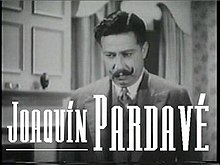Joaquín Pardavé
| Joaquín Pardavé | |
|---|---|

in Ahí está el detalle (1940)
|
|
| Born |
Joaquín Pardavé Arce September 30, 1900 Pénjamo, Guanajuato, Mexico |
| Died | July 20, 1955 (aged 54) Mexico City, Mexico |
| Occupation | Actor |
| Years active | 1919–1955 |
| Spouse(s) | Soledad Rebollo (m. 1925–55) |
Joaquín Pardavé Arce (September 30, 1900 – July 20, 1955) was a Mexican film actor, director, songwriter and screenwriter of the Golden Age of Mexican cinema. He was best known for starring and directing various comedy films during the 1940s. In some of them, Pardavé paired with one of Mexico's most famous actresses, Sara García. The films in which they starred are El baisano Jalil, El barchante Neguib, El ropavejero, and La familia Pérez. These actors had on-screen chemistry together, and are both noted for playing a wide variety of comic characters from Lebanese foreigners to middle-class Mexicans.
Pardavé was born to Spanish immigrants Joaquín Pardavé Bernal and Delfina Arce Contreras, theater actors, in Pénjamo, Guanajuato. His parents came to Mexico with the theatrical company "Betril".
After the death of his mother in 1916, Pardavé decided to settle in the city of Monterrey where he worked as a telegrapher in the Ferrocarriles Nacionales de México. There he composed the song "Carmen", dedicated to his girlfriend Carmen Delgado. Three years later, he returned to Mexico City after he learned of the death of his father.
At age 18, Joaquin Pardavé followed in the footsteps of his parents. He began his acting career in the operetta Los sobrinos del capitán Grant, in the company of his uncle Carlos Pardavé, when he asked to meet an actor. Later he joined the company of Jose Campillo, where he met and teamed for 12 years, Roberto "Panzón" Soto. His first role in this company was in the operetta La banda de las trompetas (1920). Later he won fame in the Mexican Rataplan Journal (1925).
He started his film career in the silent film era. Pardavé's film debut was in Viaje redondo in 1919. He participated in other films such as El águila y el nopal (1929), Águilas frente al sol (1932), La zandunga (1937), La tía de las muchachas (1938), En tiempos de Don Porfirio (1939).
...
Wikipedia
